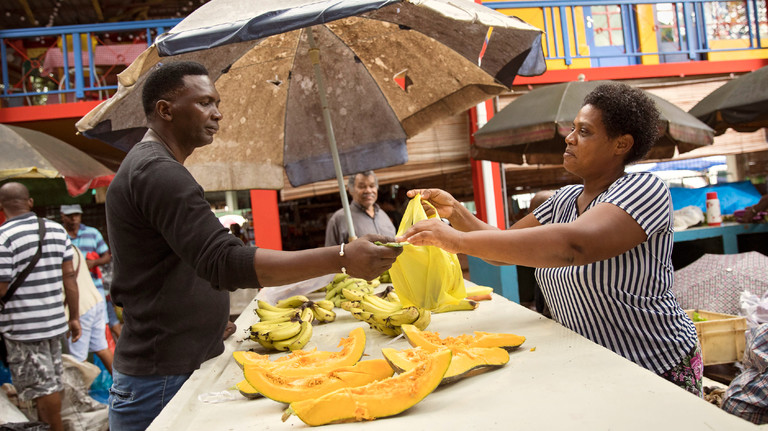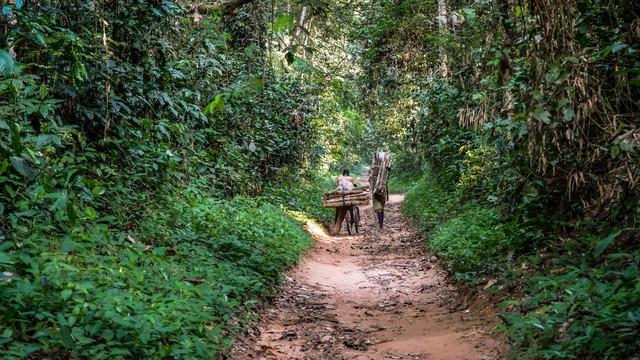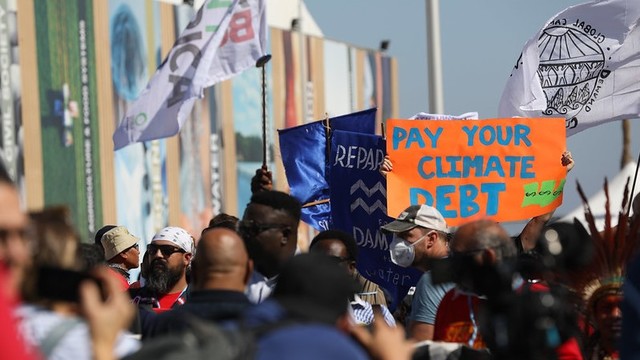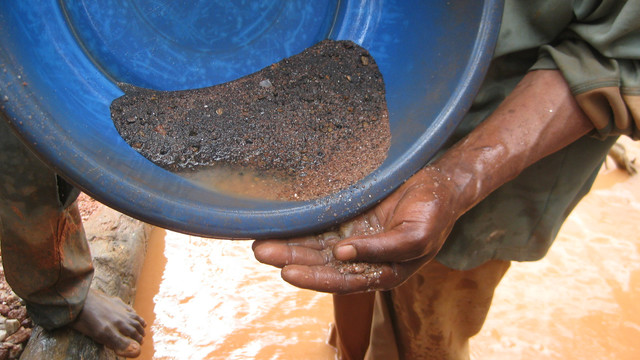
A market trader sells bananas, limes, mint, and pumpkin in Port Victoria, Seychelles. Marketplaces are key sites for economic activity and while small scale they are central to the livelihoods of many households (Photo: UN Women, via Flickr, CC BY-NC-ND 2.0)
Throughout 2020/21 and into 2021/22, IIED has been closely monitoring the delivery of its projects, including the ability of partners to carry out research.
Although COVID-19 did impact the delivery of some projects, these delays have not been significant. The primary COVID-19 related impact was the loss of UK Research and Innovation funding to two major programmes, but one was approaching closure and adapted its final-year programme, and the other has already had some success in generating alternative income to continue the majority of its work.
Income was very slightly lower than the previous year, GBP£18.2 million against £18.4 million recorded in 2019/20, while the average number of employees increased to 140 (2019:133), with further expansion in the institute's research activity (core staffing remained static).
Payments to collaborating entities increased from £3.6 million in 2019/20 to £4.6 million in 2020/21.
Supporting employees
At the beginning of the year, IIED established a coronavirus response team to monitor and respond to internal and external risks and issues. Other than a brief return to the office in autumn 2020, staff spent the majority of the year working at home, but with a programme to move all data and core systems to the cloud, the impact was minimal. Instead, IIED focused on supporting employees: working groups for health and safety and wellbeing were set up, and a furlough policy agreed with the union.
The identified strategic risks of being unable to travel internationally to support research and policy engagement activities, and a reduction in aid budgets both materialised. Despite this, the institute maintained financial and operational stability.
Prior to the pandemic, the institute had planned to extend its London office lease for a further five years. Instead, IIED left in December after 10 years, moving to serviced offices with a contract through to mid-2023. During 2022 the institute will review its overall office requirements.
IIED has no fundraising activity and is not a grant making organisation; instead it works in collaboration with its partners, resulting in no fundraising activity and grant making disclosures being given.
Reserves policy
IIED’s reserves policy is aligned with its five-year strategy launched in April 2019. To protect the organisation and its charitable programme against the risks of funding loss through income shortfalls and other unexpected financial losses, the policy sets a target for total unrestricted reserves of approximately four months of operating costs and staff salaries less liabilities from employee benefits.
This is around £2.2 million: trustees have therefore set the target range of free reserves (being total funds less restricted and designated funds) at between £1.9 million and £2.5 million.
The total funds at 2020/21 year end were £2.5m (2020: £2.6m). The total free reserves have decreased to £2.2m (2020: £2.4m), within the target range endorsed by the board.
Investment policy
IIED invested its cash in fixed-term deposits during 2020/21. This policy produces an acceptable rate of return while giving the institute flexibility to access funds.
Related parties
Some IIED trustees are also trustees of other charities or directors or senior officers in other organisations IIED works with as a normal part of its research activities. Where such work involves payment, they enter into arm’s length contracts and any payments related to these contracts are detailed in the notes to these accounts. The board operates a conflict of interest policy.
Looking ahead
Key cross-cutting institutional initiatives for 2021/22 include:
- The COP26 climate and COP15 biodiversity conferences, which will be focal points for our policy influencing
- Support for the newly-established IIED-Europe office in Amsterdam, building new partnerships and working on new projects
- Internal discussion about culture and strategy, with the findings of the race and racism working group feeding into the vision for a future IIED, and
- As the institute settles into serviced offices, IIED will be able to more clearly identify any London office requirements beyond 2023 to support our strategy and reduce our carbon footprint.
The trustees' report and accounts for the year ended 31 March 2021 contains detailed financial information, including a breakdown of all income received by IIED above £10,000.
Value for money statement
Demonstrating value for money is ever more important for organisations using public funds. With aid budgets under pressure, development organisations need to show that they are efficient, that poor people's lives are actually improving, and that the environment is protected. Read our value for money statement on our Publications Library.
Previous reports
See the financial summaries from previous years: 2020; 2019; 2018; 2017; 2016; 2015; 2014; 2013
2020/21 financial summary
Donors
Government and government agencies
Sida
Irish Aid
DFID – FCDO
Department for Environment, Food & Rural Affairs
The Secretary of State for Health
Federal Ministry for the Environment, Nature Conservation and Nuclear Safety (BMU)
Ministry of Economic Growth and Job Creation, Jamaica
Ministry of Environment, Sweden
German Institute for Development (DIE)
GIZ
Niger Basin Authority
Embassy of Sweden, Kenya
Ministry of Foreign Affairs, Ireland
International and multilateral agencies
European CommissionAsian Development Bank
World Bank
United Nations Food and Agriculture Organization (FAO)
United Nations Development Programme (United States)
The Collaborative Africa Budget Reform Initiative
UNDP, Thailand
UNDP, Bangladesh
UNEP, Nairobi
Regional Centre for Mapping of Resources
United Nations Office for Disaster Risk Reduction
UN Human Settlements Programme
World Food Programme
United Nations Office for Project Services (UNOPS)
United Nations Environment Programme (Switzerland)
Organisation For Economic Cooperation & Development
International Fund for Agricultural Development (IFAD)
United Nations Development Programme (Switzerland)
United Nations Environment Programme (Asia & Pacific)
Commonwealth Secretariat
Foundations and NGOs
Economic and Social Research Council (ESRC)
MAVA Foundation
The British Academy
IKEA Foundation
Wellspring Philanthropic Fund
World Resources Institute (WRI)
University of Manchester
Hivos
Oxford Policy Management
University of Southampton
Stockholm Resilience Centre
Arts & Humanities Research Council
Arcus Foundation
Sustainable Environment Management Action
FSD Africa
LTS International Ltd
Jamma International
WWF Netherlands
Schmidt Family Foundation
IUCN, Switzerland
World Conservation Monitoring Centre
Open Society Foundations
Global Wildlife Conservation
European Climate Foundation
International Union for Conservation of Nature
International Livestock Research Institute
Ground Truth Solutions
Engineering and Physical Sciences Research Council
International Budget Partnership
IHA Sustainability Ltd
Meridian Institute
Sustainable Market Foundation
Loughborough University Enterprises Limited
Practical Action UK
Institute of Development Studies (IDS)
WWF International
University of Edinburgh
United Cities and Local Governments
Mercy Corps USA
WWF Sweden
WYG International Ltd
Sustainable Use and Livelihoods Specialist Group
Near East Foundation
New Venture Fund
Overseas Development Institute
Charles Stewart Mott Foundation
Global Center on Adaptation
University of Evora
International Union for Conservation of Nature
Christian Aid
International Land Coalition
Tufts University
Royal Society for the Protection of Birds
Wellcome Trust
Eventbrite
International Institute for Sustainable Development
Institute of International Education
ENDA Pronat
Strathclyde University
University of Oxford
TRAFFIC International
Wellbeing Economy Alliance
British Council
International Union for Conservation of Nature
Conservation Through Public Health
Climate-KIC Holding B.V. Netherlands
Global Resilience Partnership
Corporate
PricewaterhouseCoopers LondonPricewaterhousecoopers Limited, Kenya
DAI Global Belgium SRL
Le Groupe-conseil baastel ltée
SAGE Publications Ltd
Simusolar
E-SUD DEVELOPPEMENT
Unilever United
The Palladium Group
Mott MacDonald Ltd
Altair Asesores S.L.
KPMG International (UK)
KPMG East Africa
DAI Europe LTD
IPE Global limited



